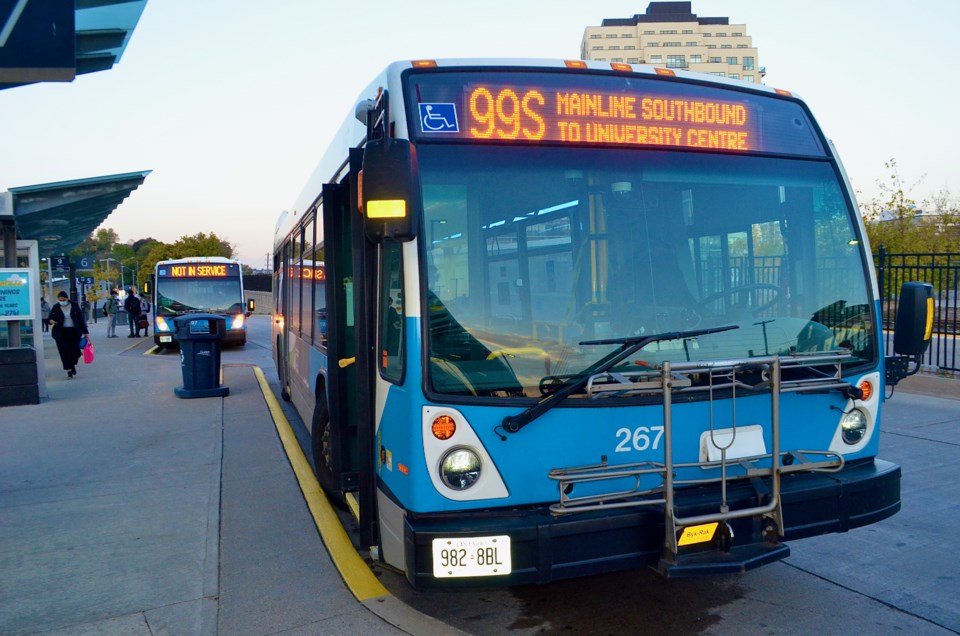Transit users hoping to escape the elements as they await their bus at Guelph Central Station will stay exposed a while longer, just as cyclists and others eager for a new pedestrian bridge must hold off on changing their route.
Expansion of Guelph Central Station and much of the work planned for a bridge connecting Emma and Earl streets over the Speed River are among the items pulled from the city’s capital works for 2023 in order to reduce spending.
Both projects were initially approved to move ahead in 2023 as part of the city’s first multi-year budget, which council endorsed in late 2021, but were removed when council confirmed this year’s budget update earlier this week.
Neither has been rescheduled at this time.
“Deferred projects will be re-budgeted in 2024 and beyond, and they will be at higher costs,” deputy CAO Trevor Lee told council ahead of its confirmation vote, referring to the impact of inflationary pressures.
In fact, it was inflationary pressures that inspired city council to grant staff the ability to reprioritize projects. It did so in April, after bids for a variety of city projects came in significantly over budget.
Overall, the 2023 capital budget was reduced to $128.16 million from $161.91 million.
The bus station project, which had been in the budget at nearly $6 million, was completely removed for 2023.
When it happens, the plan is to build a bus terminal at the opposite end of Guelph Central Station from the train station. It will include indoor seating for up to 25 people, public washrooms and dedicated washrooms/lunch room for Guelph Transit employees.
It is to be located in the empty space where platforms 21 and 22 are located and will be approximately 2,800 square feet in size.
When provincial and federal grants were announced for the project in June of 2020, construction was expected to be done by the end of 2027.
In terms of the Emma to Earl pedestrian bridge, the budgeted amount for this year was reduced from $2.03 million to $500,000.
First approved by council in 2015, the bridge was initially estimated to cost $1.8 million. The bridge is to span 90 metres over the Speed River, 200 metres downstream of Speedvale Avenue.
Spending on active transportation enhancements, including work on trails and connections, also saw their budgets significantly reduced.
They include a $3.6 million reduction in spending on a multi-use trail connection between Elmira and Imperials roads (now at $355,000), $1 million from implementation of the cycling master plan (now $1.2 million), exclusion of an at-grade trail crossing at Speedvale Avenue with a cost of $760,000, a $535,000 reduction for improving trail connectivity throughout the city (now $355,000) and $210,000 for the study and design of trail improvements.
Also removed were $821,000 for the rehabilitation of the south retaining wall at Riverside Park and $164,000 for the retaining wall along Eramosa Road.
With a previously-budgeted price of $4.5 million, city-owned infrastructure impacted by provincial government plans to improve the Hwy. 7 (Woodlawn Road) connection at the Hanlon Expressway won’t go ahead this year.
Nor will all of the planned structure modifications for Macdonell Bridge and Allan’s Dam, with spending taken down by $485,000 to $300,000.
A similar cut was made to the road resurfacing program, which now has a $3.5 million budget.
Study and remediation work at known contaminated sites was scaled back on several fronts.
They include $2.4 million for the Fountain Street parking lot (former home to Guelph Gas Works and Guelph Coal Gasification Plant), $750,000 for seven historic landfill sites located throughout the city, and $150,000 related to the former IMICO property on Beverly Street.
A plan to build up material for the new central library, previously budgeted at $2.92 million for 2023, has also been pulled.
Pushing the capital budget upward was $6 million for a computerized maintenance management system, $1.6 million added for increased water metre repairs and replacements, more than doubling of the recreation facilities maintenance budget (now at nearly $2.9 million), $1 million to automate onboarding and offboarding of city staff regarding access to IT systems, and various water system initiatives.
In most cases, the capital budget features projects that aren’t predominantly funded by property taxes, with much of the work paid for through development charges and grants.
